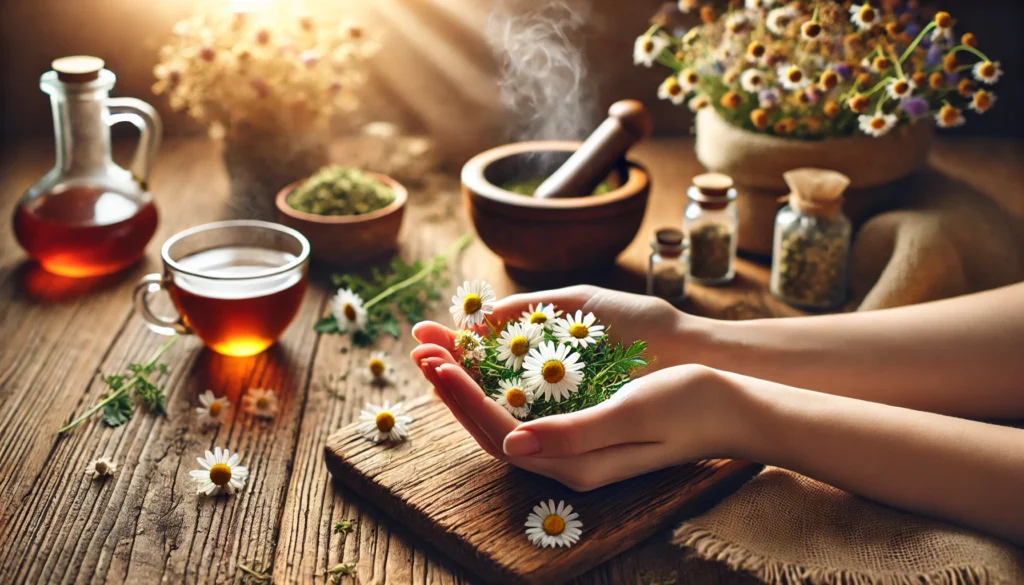In a fast-paced modern world where stress seems inevitable and mental demands are unrelenting, anxiety has become a common struggle for many adults. Although conventional treatments such as cognitive behavioral therapy and pharmaceutical medications remain integral to managing anxiety disorders, a growing number of individuals are exploring natural methods to ease their mental burden. This increasing interest in integrative health solutions raises an important question: how to alleviate anxiety naturally, and more specifically, can herbal remedies and holistic supplements provide meaningful support for mental wellness?
You may also like: Best Herbal Alternatives to Anxiolytics: Natural Remedies for Anxiety Relief
Addressing this question demands an evidence-based yet open-minded approach, one that respects the scientific literature while also honoring the experiential wisdom of traditional healing systems. Anxiety is a multifactorial condition, and so are the strategies needed to manage it. For individuals seeking answers to the question, “how do I relieve my anxiety without medications,” holistic options may offer gentle yet potent tools. This article delves deeply into the realm of natural anxiety relief, evaluating the potential of herbs, adaptogens, vitamins, lifestyle interventions, and mind-body practices that align with holistic principles.
Understanding Anxiety Through a Holistic Lens
To appreciate the potential of natural remedies, it is essential to understand anxiety from a holistic standpoint. Anxiety is not merely a mental or emotional concern—it often has physiological, nutritional, environmental, and even spiritual dimensions. Symptoms such as heart palpitations, racing thoughts, muscle tension, and insomnia may be the result of systemic imbalances that cannot be fully addressed through symptom suppression alone. A holistic approach seeks to identify and support the root causes of distress, offering a more sustainable path toward mental equilibrium.
This perspective encourages us to view the mind and body as interconnected, dynamic systems. From this vantage point, the question shifts from merely how to alleviate anxiety to how to support the entire person in cultivating resilience, calm, and inner peace. Natural remedies become tools to help restore balance rather than quick fixes or panaceas. This shift in thinking is especially important in avoiding the false promise of miracle cures, a common pitfall in both conventional and alternative medicine spheres. Instead, a holistic approach recognizes that healing takes time, consistency, and often, a multifaceted strategy.

The Science of Herbal Remedies for Anxiety
For centuries, cultures around the world have relied on plants to soothe the nervous system, reduce fear-based responses, and promote emotional clarity. While anecdotal evidence abounds, modern scientific inquiry has begun to validate the use of several key herbs for anxiety relief. Among the most researched and effective are passionflower, valerian root, lemon balm, lavender, and kava. Each of these botanicals operates through unique mechanisms, interacting with neurotransmitters, modulating the stress response, or enhancing sleep quality.
Passionflower (Passiflora incarnata), for instance, has demonstrated anxiolytic properties through its influence on GABA receptors—similar to the way benzodiazepines work, but without the same addictive potential. Valerian root is well-known for its sedative effects and is often used in combination with other calming herbs to help with sleep disturbances that frequently accompany anxiety. Lemon balm has been shown to improve mood and cognitive performance, while lavender is widely praised for its aromatherapeutic and oral preparations. Kava, though effective, must be approached with caution due to potential liver toxicity. Its benefits in reducing social anxiety and improving subjective wellbeing are notable, but users should be monitored for safety.
These herbal options offer potential pathways for those asking, “how do I relieve anxiety naturally?” However, it is vital to ensure that herbal treatments are sourced from reputable providers, free from contaminants, and used under the guidance of a qualified practitioner. While herbs may appear benign, they are powerful bioactive compounds that can interact with medications and affect individuals differently.
Adaptogens: Bridging the Gap Between Stress and Serenity
Adaptogens are a class of herbal compounds that help the body resist stressors and restore physiological balance. Rather than acting on a single neurotransmitter pathway, adaptogens work by modulating the hypothalamic-pituitary-adrenal (HPA) axis, a central player in the body’s stress response. When anxiety results from chronic stress, adaptogens can play a critical role in recalibrating the body’s baseline and promoting resilience.
Ashwagandha, rhodiola, holy basil, and eleuthero are among the most commonly used adaptogens for anxiety. Ashwagandha, an Ayurvedic herb, has been extensively studied for its cortisol-lowering effects and ability to reduce both subjective stress and physiological markers of anxiety. Rhodiola rosea, native to Arctic regions, enhances stamina and mental clarity while reducing fatigue-induced anxiety. Holy basil (Ocimum sanctum) promotes emotional balance and is revered in traditional Indian medicine as a sacred plant for mind-body healing. Eleuthero, often referred to as Siberian ginseng, supports energy and adaptation to physical and mental stress.
The beauty of adaptogens lies in their capacity to build long-term resilience. For individuals wondering how to alleviate anxiety without relying on short-acting interventions, adaptogens offer a sustained, system-wide benefit. However, like all supplements, they require careful dosing, proper formulation, and attention to individual constitution. As with any therapeutic approach, personalization is key.
Holistic Supplements That Support Emotional Health
Beyond herbs and adaptogens, various nutrients play crucial roles in mental wellness. The brain requires a steady supply of vitamins, minerals, amino acids, and fatty acids to maintain optimal function. Deficiencies in key nutrients can mimic or exacerbate anxiety symptoms, and in some cases, targeted supplementation can make a profound difference.
Magnesium, for example, is often referred to as the “relaxation mineral.” It modulates the nervous system, reduces excitability, and supports sleep quality. Studies have shown that individuals with anxiety disorders often have lower serum magnesium levels, and supplementation can help regulate mood. Omega-3 fatty acids, particularly EPA and DHA found in fish oil, have anti-inflammatory properties that extend to the brain. These fats help regulate neurotransmission and have been linked to lower rates of anxiety and depression.
B vitamins, especially B6, B9 (folate), and B12, are vital for neurotransmitter synthesis and methylation processes that affect emotional regulation. Inadequate levels can lead to fatigue, irritability, and increased susceptibility to stress. L-theanine, an amino acid found in green tea, promotes alpha brain wave activity, which correlates with calm alertness. It can be used alongside caffeine to counteract jitteriness or on its own as a gentle anxiolytic.
When exploring how to alleviate anxiety through supplementation, it is essential to understand that more is not always better. Quality, dosage, bioavailability, and individual biochemical needs must be considered. Working with a healthcare professional who specializes in integrative or functional medicine ensures that supplementation is both safe and effective.

Mind-Body Practices: Synergizing the Natural Approach
Herbal and nutritional interventions gain greater efficacy when combined with lifestyle practices that foster mind-body integration. Meditation, breathwork, yoga, tai chi, and progressive muscle relaxation have all demonstrated benefits for anxiety management. These modalities help shift the nervous system from sympathetic dominance—the fight-or-flight response—into parasympathetic mode, where healing and restoration can occur.
Mindfulness meditation has been extensively researched and is known to enhance self-awareness, reduce rumination, and improve emotion regulation. Breath-focused practices like coherent breathing or the 4-7-8 technique directly influence the vagus nerve, promoting a state of calm and relaxation. Yoga combines movement, breath, and mindfulness, making it a particularly effective tool for anxiety reduction. Tai chi offers a gentle, meditative approach to movement, improving balance and internal focus.
What makes these practices especially valuable is their ability to create new neural pathways through neuroplasticity. Over time, the brain becomes more capable of responding to stress in adaptive ways. For individuals asking how do I relieve anxiety holistically, incorporating these techniques can provide profound and lasting benefits that enhance the effects of natural remedies.
Lifestyle Factors That Influence Anxiety and Natural Relief
Beyond supplementation and mind-body interventions, several lifestyle factors play a foundational role in mental wellness. Sleep quality, physical activity, exposure to nature, social connections, and screen time habits can either buffer or exacerbate anxiety symptoms. Addressing these areas often reveals overlooked contributors to chronic worry and stress.
Poor sleep hygiene is one of the most common and underappreciated triggers of anxiety. The relationship is bidirectional: anxiety impairs sleep, and poor sleep increases anxiety. Establishing a consistent bedtime routine, limiting blue light exposure in the evening, and using herbs like valerian or melatonin precursors can significantly improve sleep and, by extension, anxiety levels.
Exercise, especially aerobic activity, stimulates endorphin release and supports the regulation of stress hormones. Regular physical movement also improves self-esteem and provides a constructive outlet for emotional energy. Nature exposure—sometimes called “green therapy” or ecotherapy—has been shown to reduce cortisol levels and enhance feelings of peace and connectedness. Even short walks in natural settings can have measurable effects on mood and anxiety.
Social relationships also play a key role in mental health. Isolation and loneliness are significant risk factors for anxiety and depression. Cultivating meaningful connections, whether through community involvement, support groups, or quality time with loved ones, can provide emotional buffering during difficult times. Likewise, moderating screen time—particularly social media use—can prevent overstimulation and reduce anxiety triggered by comparison or information overload.
Creating a Personalized Plan for Natural Anxiety Relief
Given the broad range of options available, it can be overwhelming to know where to begin. A successful natural anxiety relief strategy is one that is personalized, adaptable, and integrated into daily life. The goal is not to do everything at once but to identify the most supportive tools for one’s unique constitution and circumstances.
One starting point is to evaluate current lifestyle patterns and identify potential areas of improvement. Are there nutrient gaps? Is sleep restorative? Are relationships nurturing or draining? These questions help prioritize interventions. From there, adding one or two herbal or nutritional supplements under professional guidance can offer tangible support. Incorporating breathwork or a brief daily mindfulness practice helps anchor the nervous system.
Regular reflection on progress, combined with adjustments as needed, ensures that the approach remains effective over time. Journaling, mood tracking, or working with a therapist trained in integrative modalities can offer insight and accountability. For many individuals asking how to alleviate anxiety without prescription drugs, a steady, sustainable plan rooted in holistic principles can offer not only symptom relief but also personal growth and empowerment.

Looking Ahead: Integrating Natural Remedies into the Mainstream
As the field of mental health evolves, there is increasing recognition of the role that holistic and natural therapies can play in comprehensive care. While not a replacement for evidence-based clinical treatment, herbal remedies and supplements can serve as valuable adjuncts. Continued research into the safety, efficacy, and mechanisms of these interventions is crucial to ensure they are used responsibly.
Medical schools and mental health training programs are beginning to include modules on nutrition, integrative care, and mind-body medicine. This shift reflects a broader cultural movement toward personalized, preventative, and participatory health models. For those seeking answers to the question of how do I relieve anxiety in a sustainable way, this new paradigm offers both hope and practical solutions.
Frequently Asked Questions: How to Alleviate Anxiety Naturally
What are some overlooked daily habits that may worsen anxiety despite a natural regimen? Even when individuals follow a natural anxiety relief routine, certain daily habits may unknowingly counteract progress. For instance, irregular blood sugar levels due to skipping meals or eating high-glycemic foods can spike cortisol and increase feelings of anxiety. Similarly, excessive multitasking and overuse of digital devices can keep the nervous system in a hyper-aroused state, preventing the body from fully activating its parasympathetic response. For someone asking, “how do I relieve anxiety with natural tools,” it’s important to examine lifestyle details, like sleep consistency and hydration. Awareness of these subtle influences can enhance the effectiveness of a holistic plan.
Can music therapy complement herbal and holistic approaches to anxiety? Music therapy, while not often discussed alongside herbal interventions, can significantly amplify the calming effects of natural treatments. Research shows that music activates areas of the brain associated with emotion and memory, influencing mood through both psychological and physiological pathways. When someone is exploring how to alleviate anxiety using non-pharmaceutical strategies, pairing herbs like lavender or lemon balm with soothing instrumental music can deepen relaxation and aid emotional processing. Additionally, customized playlists designed to evoke safety or nostalgia may promote neuroplasticity by reinforcing feelings of peace. This integration provides an accessible, low-cost enhancement to traditional herbal remedies.
Are there any sensory-based techniques that support anxiety relief in real time? Yes, sensory regulation techniques such as aromatherapy, cold exposure, or tactile grounding can immediately influence emotional states. Aromatherapy, especially using essential oils like bergamot or vetiver, stimulates the olfactory nerve and sends calming signals to the brain. Cold exposure, such as placing a cool compress on the chest or splashing the face with water, activates the dive reflex, which lowers heart rate and promotes calm. For those wondering how do I relieve sudden anxiety spikes without medication, engaging the senses offers immediate physiological grounding. These tools work well in conjunction with herbal tinctures or adaptogens to create a more holistic intervention.
How do spiritual or existential beliefs influence the success of natural anxiety treatments? Spiritual frameworks often provide a sense of meaning, safety, and coherence, which can greatly influence an individual’s response to holistic therapies. People who feel aligned with a purpose or spiritual path may experience enhanced results from natural approaches because they trust the process and engage more deeply. Whether it’s prayer, meditation, nature-based rituals, or energy healing, the ability to contextualize anxiety within a broader spiritual narrative can reduce emotional reactivity. Asking how to alleviate anxiety naturally sometimes leads to examining deeper life themes rather than only treating symptoms. Practitioners who acknowledge a client’s spiritual beliefs may facilitate more meaningful healing outcomes.
Can natural anxiety remedies be used during major life transitions or trauma recovery? Absolutely, but with careful attention to timing, dosage, and emotional context. Herbal support during transitions such as divorce, relocation, or grief can help regulate the nervous system and prevent chronic stress from settling into the body. However, trauma can sometimes cause paradoxical reactions to even gentle herbs, especially those that have sedative properties. In these cases, microdosing or using topical forms may be better tolerated. For someone asking, “how do I relieve trauma-related anxiety naturally,” it’s crucial to work alongside a trauma-informed practitioner. This ensures that herbal and supplemental interventions are introduced at a pace aligned with the individual’s readiness.
Are there specific foods that naturally enhance the effectiveness of herbal anxiety supplements? Certain foods can significantly bolster the action of herbal and nutritional anxiety aids by supporting neurotransmitter production and absorption. Foods rich in tryptophan, such as turkey, pumpkin seeds, and oats, can elevate serotonin when paired with B-complex vitamins. Fermented foods like kimchi, kefir, and miso support gut health, which is intricately linked to mood regulation via the gut-brain axis. Those learning how to alleviate anxiety naturally should consider dietary synergy—not just what to take, but what to eat to help those supplements work better. Integrating these functional foods helps the body utilize the full spectrum of healing compounds.
How can people tailor natural anxiety strategies to different phases of life, such as adolescence, pregnancy, or aging? Each life stage presents unique physiological and psychological challenges, so a one-size-fits-all approach rarely works. Adolescents may benefit more from lifestyle interventions, such as exercise and peer support, than from strong herbal remedies. During pregnancy, options become more limited, but gentle teas like chamomile (in moderation) and mindfulness practices can be effective. Older adults may face nutrient absorption issues, making targeted supplementation more important. When someone asks how do I relieve anxiety as my body changes, it’s important to understand that natural approaches must evolve accordingly. Consulting professionals who specialize in age-specific care is a smart way to personalize support.
What role does gut health play in natural anxiety management? Gut health is now recognized as a foundational aspect of mental well-being due to the gut-brain connection. The enteric nervous system communicates directly with the central nervous system, and imbalances in gut flora can influence anxiety levels through inflammatory and hormonal pathways. Probiotics, prebiotics, and dietary changes that reduce processed foods can dramatically shift emotional stability. Exploring how to alleviate anxiety naturally often requires addressing hidden sources of dysbiosis or leaky gut. This internal ecosystem plays such a pivotal role that even the most well-formulated herbal remedy may underperform if digestive health is neglected.
Is it possible to build a sustainable routine that combines multiple natural strategies without burnout? Yes, but sustainability requires prioritization, self-awareness, and a phased approach. Rather than adopting multiple supplements, dietary changes, and mindfulness practices all at once, starting with one or two habits and layering in others as comfort grows can prevent overwhelm. For those wondering how do I relieve anxiety without creating more stress through health routines, it’s essential to start where energy and motivation already exist. Small successes build confidence, which reinforces consistency. A well-structured, flexible routine eventually becomes second nature and can provide a long-term buffer against anxiety.
Are there any promising new trends in the field of natural anxiety relief? Several emerging trends are capturing attention in holistic health circles. These include the use of psychedelic-assisted therapy with natural compounds like psilocybin, microdosing of functional mushrooms such as lion’s mane, and the development of AI-assisted mental health apps that integrate breathwork and herbal protocols. Additionally, wearable biofeedback devices are being used to enhance awareness of stress patterns in real time. For individuals seeking how to alleviate anxiety naturally while staying informed about innovation, these advancements offer intriguing possibilities. As research continues, these tools may become more widely accessible and regulated for safety and efficacy.
Conclusion: Embracing a Holistic Path to Mental Calm and Clarity
Learning how to alleviate anxiety naturally invites a journey of self-discovery, patience, and empowerment. By embracing herbal remedies, holistic supplements, mind-body practices, and intentional lifestyle changes, individuals can tap into the body’s innate capacity for healing and balance. Rather than viewing anxiety solely as a condition to be eliminated, this perspective reframes it as a signal—a call to deeper alignment, greater self-care, and conscious living.
For those asking how do I relieve anxiety in a way that honors both science and soul, the holistic path offers a compassionate and comprehensive approach. It is not about abandoning conventional care but about expanding the toolkit, embracing natural rhythms, and reconnecting with time-honored wisdom. The integration of holistic practices into mainstream wellness holds the potential to transform not only individual lives but also our collective approach to mental health.
As we continue to explore and validate these natural strategies, we do so with the understanding that healing is multifaceted, deeply personal, and worthy of respect. The question is no longer just how to alleviate anxiety—it is how to live more fully, more mindfully, and more vibrantly in the face of life’s inevitable challenges.
natural anxiety relief, herbal anxiety remedies, calming herbs for stress, adaptogens for stress relief, holistic mental health, natural mood support, magnesium for anxiety, ashwagandha benefits, supplements for emotional wellness, herbal support for mental clarity, integrative anxiety treatments, botanical remedies for stress, mind-body wellness strategies, non-pharmaceutical anxiety solutions, natural nervous system support, mental health and nutrition, emotional resilience techniques, anxiety and lifestyle changes, herbal support for calm, natural ways to manage stress
Further Reading:
10 Natural Ways to Reduce Anxiety
How to treat anxiety naturally
Herbal treatment for anxiety: Is it effective?
Disclaimer
The information contained in this article is provided for general informational purposes only and is not intended to serve as medical, legal, or professional advice. While NewsHealthWatch strives to present accurate, up-to-date, and reliable content, no warranty or guarantee, expressed or implied, is made regarding the completeness, accuracy, or adequacy of the information provided. Readers are strongly advised to seek the guidance of a qualified healthcare provider or other relevant professionals before acting on any information contained in this article. NewsHealthWatch, its authors, editors, and contributors expressly disclaim any liability for any damages, losses, or consequences arising directly or indirectly from the use, interpretation, or reliance on any information presented herein. The views and opinions expressed in this article are those of the author(s) and do not necessarily reflect the official policies or positions of NewsHealthWatch.

